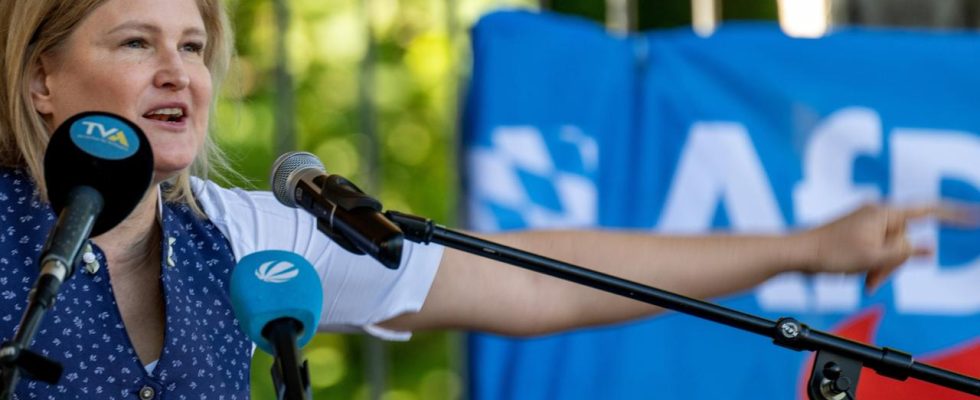analysis
The CSU and Free Voters will continue to govern Bavaria – and yet something has changed in the relationship between the coalition partners. The traffic light parties are feeling the frustration of the federal government, with the AfD benefiting the most.
It was a remarkable sentence that Markus Söder shouted to his supporters on election evening: “It was never about a beauty prize for us, but about a clear government mandate.” It is questionable whether the majority of the CSU base would support their boss’s assessment.
The statement hardly captures the mood during the Bavarian state election campaign: a “clear government mandate” for Söder’s party was practically never in question. The gap to the political competition was too great across all surveys.
In truth, for the CSU it is always about much more than just somehow putting together a government and appointing the Prime Minister. It’s about prestige, it’s about the sovereignty of interpretation in the Free State and it’s also about naked percentages. A CSU at 34 percent would have had a government mandate just as much as one at 40 percent – and yet there is a world of difference between these two numbers.
No tailwind for a possible one Candidacy for chancellor
In the end, the Christian Socialists ended up with 37.0 Percent. In other parts of Germany, this would be a vote to celebrate for almost every party – but not for the CSU in Bavaria, where quite a few supporters still secretly dream of an absolute majority.
The 37.2 percent in the 2018 state election was already devastating for the CSU’s self-image. Now things went down a little further: no beauty prize for Söder and no tailwind in the race for the candidate for chancellor within the Union, which the sister parties want to decide on next year.
Free voters go in stronger Coalition negotiations
Instead, Söder initially faces difficult coalition negotiations. Not because the CSU is at odds with the Free Voters in terms of content. But rather because the Free Voters around their boss Hubert Aiwanger are now likely to appear much more self-confident than they did five years ago. The party gained more than four percentage points, ending up at 15.8 percent and becoming the second strongest party with the best result in its history. Neither the leaflet affair nor ongoing accusations of populism have harmed Aiwanger – quite the opposite. His story that he was the victim of a “smear campaign” was misleading.
Söder noticeably disliked the fact that Aiwanger had attracted so much attention to himself in the past few weeks and was sometimes celebrated like a pop star in Bavaria’s beer tents. Aiwanger had put the CSU and Söder in distress not just with the anti-Semitic leaflet, but also with his vaccine skepticism during the corona pandemic and his “bring back democracy” speech in Erding.
The two party leaders never had a friendly relationship. During public appearances, Söder left no doubt as to who, in his eyes, was the chef and who was the waiter in the Bavarian State Chancellery. Aiwanger is stronger after the election, Söder is not – that should not bode well for the personal relationship between the CSU Prime Minister and his deputy. The struggle for a fourth ministry, as is already being discussed by the Free Voters, could be just one of many points of contention.
All traffic light parties lose
Söder pursued a clear strategy in the election campaign: it was against the federal government in general and against the Greens in particular. And the bars of all traffic light parties in Bavaria actually went down. In some cases the losses were dramatic.
The Greens were able to mobilize their core electorate and are now only the fourth strongest force in the state parliament with 14.4 percent (minus 3.2 percentage points). The Chancellor’s Party, the SPD, once again undercut its disastrous result from 2018 (9.7 percent) and is now well into single digits at 8.4 percent.
And the FDP was far behind with 3.0 percent and was completely thrown out of parliament. All three parties took full advantage of the population’s dissatisfaction with the federal government.
AfD absorbs traffic light frustration
So Söder’s traffic light bashing worked, but differently than the Prime Minister intended. The losses did not affect the CSU as hoped, but rather the Free Voters – and especially the AfD. With 14.6 percent, she is the biggest winner in this state election. With a significant gain of 4.4 percentage points, it will become the third largest party and most likely the opposition leader in the Bavarian parliament.
The fact that the top duo Martin Böhm and Katrin Ebner-Steiner were largely unknown in the Free State did not hurt the AfD. She also didn’t have to come up with any constructive solutions to the problems in Bavaria. State political issues such as education or housing hardly played a role in this election campaign anyway. The AfD absorbed the frustration with the traffic light parties for itself. In the upcoming legislature it will play a more important role than before.
Bavaria is a predominantly conservative, rural state. The CSU has ruled since 1957. Now the Free Voters and the AfD have gained support. The Free Voters with a party leader Aiwanger who repeatedly fishes in right-wing populist territory. It is not for nothing that almost 40 percent of Free Voters supporters said in the pre-election surveys that they would vote for the AfD if the Free Voters did not exist.
And the AfD made gains with a top duo that is considered to be part of the right-wing extremist wing of the party around the Thuringian state leader Björn Höcke. Bavaria has moved a little further to the right as a result of these state elections.

